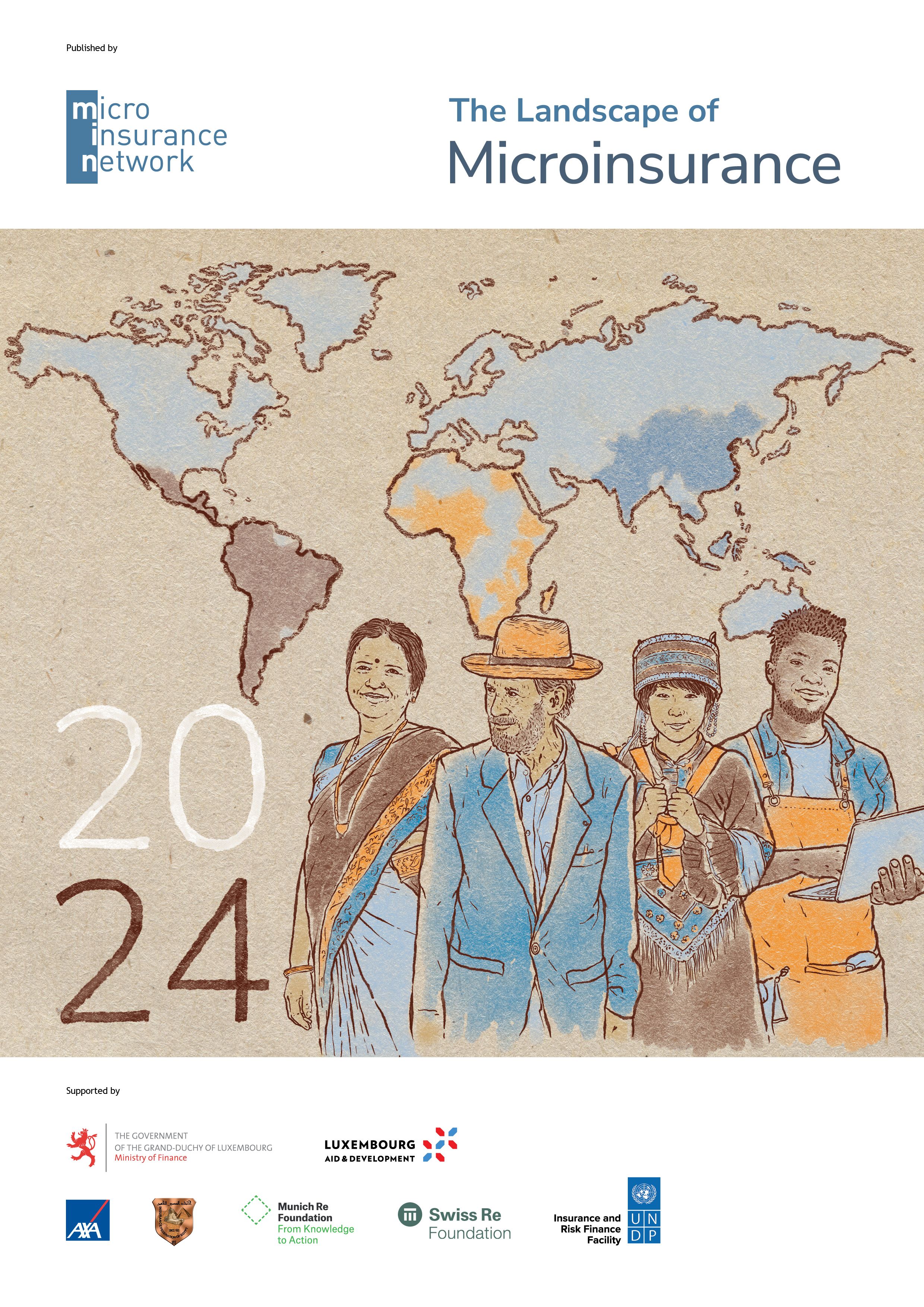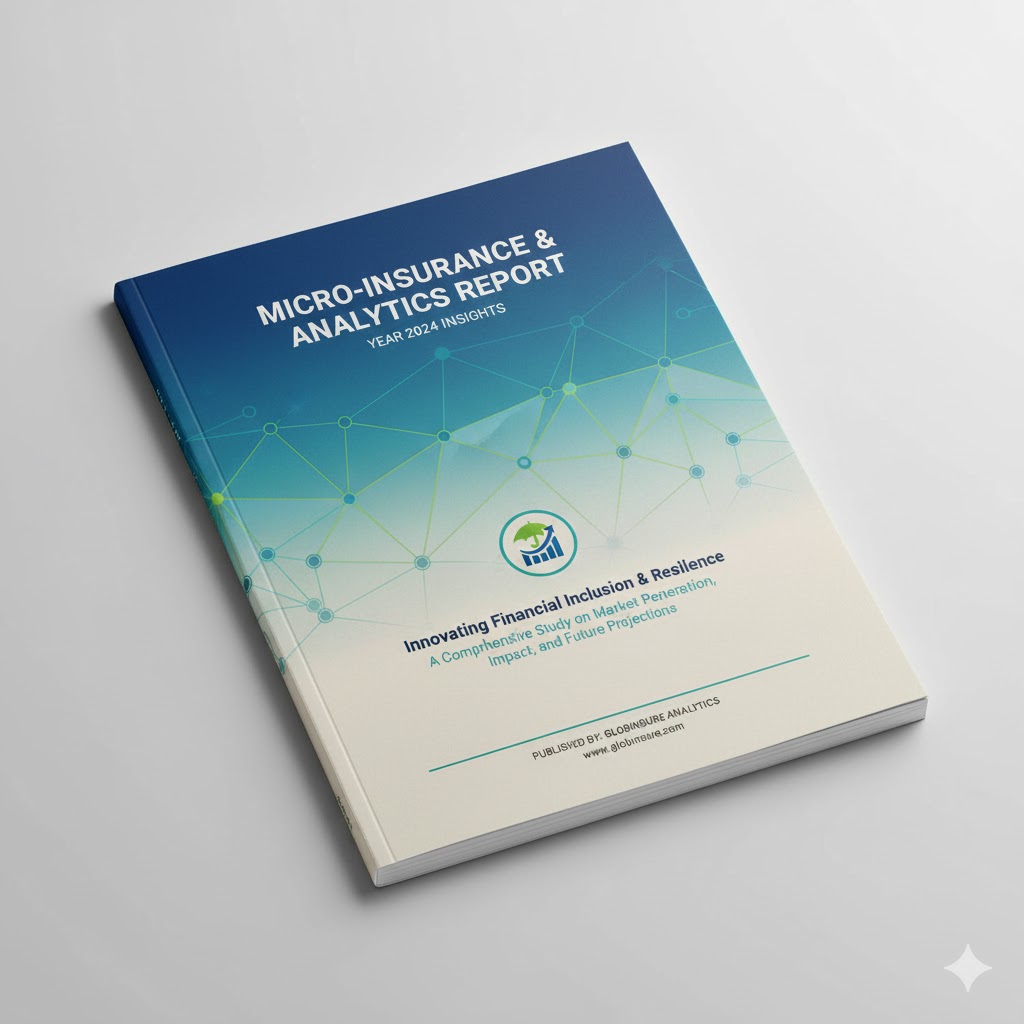Displaying 1 - 15 of 23

The Landscape of Microinsurance 2024
The Landscape of Microinsurance 2024 analyzes the growth and evolution of microinsurance, highlighting its critical role in supporting vulnerable populations facing climate shocks, crises, and financial insecurity. It covers 344 million people across 37 countries, examines regulatory frameworks, distribution channels, and subsidies, and emphasizes the need to close the protection gap while fostering long-term market development.
Fecha de emisión
2024
Temas
Asunto (Producto)
Región

ACRE Africa provides micro-insurance products to strengthen farmer resilience
ACRE Africa partners with insurers to offer affordable index-based crop insurance to smallholder farmers. Uses weather stations and satellite rainfall data to trigger payouts automatically.
Fecha de emisión
2021
Temas
Asunto (Producto)
Región

AXA MANSARD, NIGERIA – The case for insuring women for a better tomorrow
AXA Mansard, one of Nigeria's largest insurance providers, launched a focused strategy in 2016 to serve women in the retail insurance space. This initiative emerged from detailed market research identifying the unique needs of Nigerian women. AXA tailored products specifically for this segment and forged partnerships with women-led organizations to build trust and raise awareness about insurance. The case highlights practical lessons from product innovation, inclusive marketing, and collaboration as a pathway to greater gender equity in insurance.
Fecha de emisión
2020
Temas
Asunto (Producto)
Región

Better Weather Protection for Tanzanian Farmers
One Acre Fund and Global Parametrics piloted an innovative weather-index microinsurance solution using the Water Balance Index for ~70,000 Tanzanian smallholder farmers. The parametric cover enabled timely payouts and improved resilience against drought and excess rain.
Fecha de emisión
2021
Temas
Asunto (Producto)
Región

Bringing Health Microinsurance to Kenyans via Mobile Phone
Kenya-based pilot that bundled hospital cash, digital loans, and mobile health tools to increase access and affordability. MicroEnsure piloted Fearless Health by combining hospital cash benefits with mobile-enabled digital health loans to support underserved Kenyan populations.
Fecha de emisión
2018
Temas
Asunto (Producto)
Región

Case Study: Through Rain or Drought, Crop Insurance Provides a Protective Umbrella for Us
ACRE Africa's crop index insurance enabled Kenyan smallholder farmers to recover from climate shocks. This pioneering weather-index product helped sustain productivity and manage agricultural risks by offering timely protection against drought and other climate-related threats.
Fecha de emisión
2016
Temas
Asunto (Producto)
Región

COVID-19 and the Insurance Industry: Why a Gender-Sensitive Response Matters
COVID-19 and the Insurance Industry: Why a Gender-Sensitive Response Matters. This guidance note explores how the COVID-19 pandemic affected the gender gap in insurance access and services. It identifies four key areas where applying a gender lens can improve customer-centricity: operational practices, brand communication, product innovation, and new distribution channels. With practical insights from IFC's Women's Insurance Program, the paper offers a roadmap for insurers to better serve women during and beyond crisis periods.
Fecha de emisión
2020
Región

Empowering Women Smallholder Farmers through Digital Microinsurance
Photo essay by ADFI and Pula showing gender-inclusive insurance design using mobile platforms and bundled climate microinsurance products across Kenya, Nigeria, and Zambia.
Fecha de emisión
2022
Temas
Asunto (Producto)
Región

Empowering Women, Building Trust: A Case Study of a Women-Centric Insurance Solution in Nigeria
Describes FCMBeta Health, a women-focused micro health insurance product in Nigeria, bundled with micro-loans, offering hospital cash and maternity coverage. Over 90,000 enrolled by 2025.
Fecha de emisión
2025
Temas
Asunto (Producto)
Región

Enhancing Agricultural Productivity through Yield Estimation Initiatives in Partnership with the Farm-to-Market Alliance
Details ACRE Africa & FtMA project in Kenya to improve crop index insurance using geo-mapped yield data and local training.
Fecha de emisión
2024
Temas
Asunto (Producto)
Región

Exploring the Role of Microinsurance in Financial Inclusion: a Tanzanian Case Study
Explores mobile-based microinsurance and its role in Tanzania's financial inclusion strategy.
Fecha de emisión
2024
Temas
Región

Global Parametrics & One Acre Fund Provide Weather Protection for Tanzanian Farmers
One Acre Fund, a nonprofit that supports smallholder farmers, partnered with Global Parametrics to pioneer a new Water Balance Index protecting 70,000 farmers in Tanzania from drought and excessive rainfall. This index-based weather insurance enables fast, affordable payouts, strengthening farmers' resilience to a volatile climate.
Fecha de emisión
2021
Temas
Asunto (Producto)
Región

IFC Inclusive Business Case Study: MicroEnsure
MicroEnsure bundled insurance with mobile loans and airtime in 15 countries. By 2016, this model had scaled to reach over 40 million clients and included 200+ insurance products. It illustrates a high-impact approach to mobile-enabled microinsurance delivery with large-scale outreach.
Fecha de emisión
2016
Temas
Asunto (Producto)

Insurance Automation by Lead Foundation in Egypt
Insurance automation initiative led by Lead Foundation in Egypt, exploring how digital systems can enhance access to inclusive life insurance. The case outlines the broader poverty and economic context, key capacity-building interventions, implementation strategy, and an honest reflection on both the successes and challenges faced. It also discusses project outcomes and lessons learned, offering a blueprint for tech-enabled insurance in underserved regions.
Fecha de emisión
2019
Temas
Asunto (Producto)
Región

Lead Family Insurance by Lead Foundation in Egypt
Insurance Automation by Lead Foundation in Egypt. This case outlines the economic and poverty context in which the intervention took place, including the project's approach to capacity building and automation. It highlights both the results achieved and not achieved, and captures key lessons learnt in delivering health and credit life insurance to underserved populations.
Fecha de emisión
2020
Temas
Asunto (Producto)
Región
